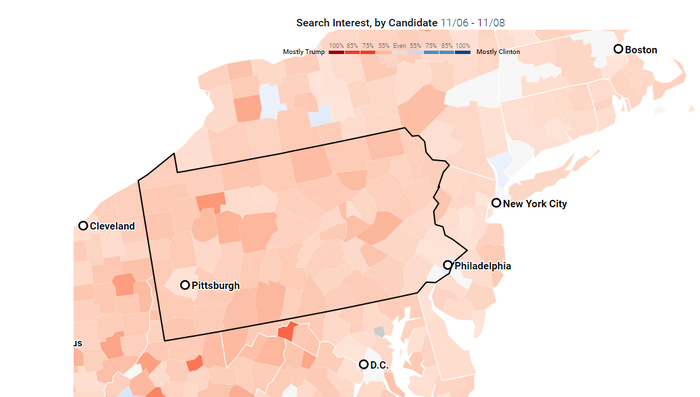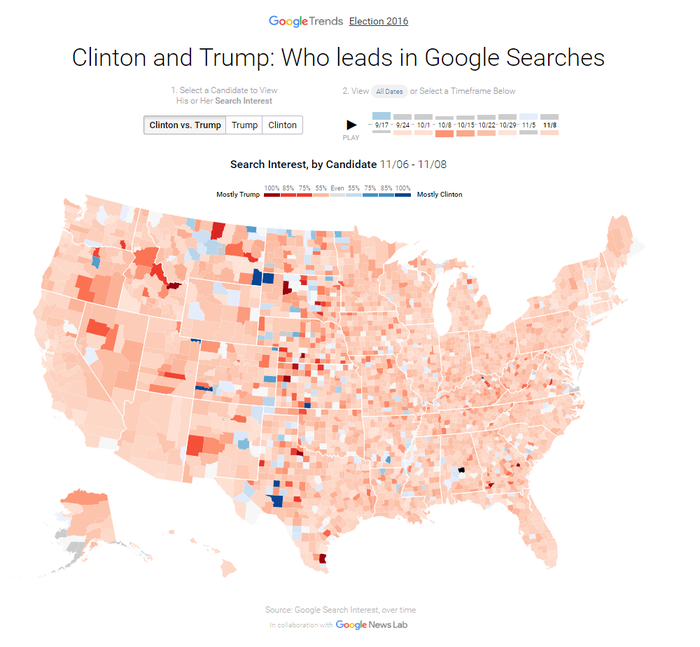Predicting the polls - did Google know Trump and Brexit would happen?
In the aftermath of 2016’s second historical political event, we ask whether Google search data predicted both Brexit and Donald Trump’s win.
November 10, 2016

In the aftermath of 2016’s second historical political event, we ask whether Google search data predicted both Brexit and Donald Trump’s win.
Social media went mental, protests rose up across the country and civil unrest threatens to dominate the days following Donald Trump securing his seat in the Oval Office for the next four years. It was a similar tale for the Brexit vote in June.
So far, things aren’t quite as crazy today as they were in the immediate aftermath yesterday; and over in the UK the view from the outside reminds us all of Brexit. In each election, the majority of people were left surprised by the outcome, and the level of consternation stemmed from the pollsters’ inability to definitively determine the general attitude of the average Joe.
On each occasion (Brexit and the US presidential election), pollsters predicted narrow wins for the eventual losers, presumably based on the opinions of the more outspoken minority – in the case of Brexit the minority was the defeated Remain campaign, obviously more recently it was the Democratic voters.
Since the election, Google has announced how search trends leaned towards either Trump or Clinton as the election campaign reached its climax over the last six weeks. The analysed period includes the three televised presidential debates so fluctuations in who dominated search rankings is only natural.
The question of reliability is always a valid one in this context. Political occasions such as this have such immense significance and societal impact that inaccuracies are no longer tolerated. People lie, people search for negative stuff online as much as they do positive, so the reliability of search trends en masse is questionable when you’re looking for specific and granular insight.
“When you have something as big as an election, you’ll find it will always be open to data sourcing issues,” Jonathan Forbes, CTO of Analytics from data specialists Aquila Insights told Telecoms.com. “Why? Well people lie, many have strong views but don’t want to talk to pollsters, different polling channels have biases, and most obvious, people change their mind. The difficulty of modelling human motivation at scale, the impact of externalities, margins of error and revealed preference, really means that there’s always scope for an against-the-odds win. A more sophisticated approach is required to understand why people do what they do.”
That said, the level of insight available if a political party were to fully harness search data could be golden. Imagine if, say, the Remain camp from Brexit were able to fully understand the thought processes, the concerns, the insecurities and priorities of the UK people while running the campaign. That opens up a separate ethical and legal debate entirely around digital privacy when being used to further political ambitions.
IP law specialist Oliver Smith from Keystone Law says, in the UK at least, mining search data is a bit of a legal grey area.
“Under the Data Protection Act 1998, information about peoples’ political opinions is treated as sensitive personal information,” Smith told Telecoms.com. “… because the information is deemed ‘sensitive’ personal data, then if they do not have the person’s explicit consent for the use intended then they must show the use is for the legitimate activities of a non-profit political organisation with which the person has regular contact and has safeguards to protect their rights. It is unlikely that political campaigners gaining sensitive data from a search engine will have had regular direct contact with the person.”
From a purely observational perspective, however, could Google – or your preferred search engine – predict the outcome of an election before the vote has even happened? The below chart from Google illustrates search results for the various US candidates (don’t forget there were more than two nominees), sampled over a week-long period.
Ignore the obvious spike on the morning of 9th November, and you can see his online popularity surging ahead of his rivals in the 5 days previous. It might be obvious, but it is worth pointing out that there’s a significant percentage of voters who only begin swatting up in the 72-48 hours before polling day.
In fact, it was something of a surprise when the key battleground of Pennsylvania fell for Trump – the state had been widely tipped by pollsters as being a Clinton win for a key 20 electoral votes. We can see that Google search data narrowly favoured Trump in the three days leading up to and including polling day.

The same trend is observed in the below chart illustrating UK searches for “Brexit”, “Leave”, or “Remain” in the three weeks leading up to the vote. As an aside, it is terrifying that the most searched term in the UK on the 24th June, the day following the Brexit vote, was “What is the EU.”
What is undeniable is how engrained into society search engines now find themselves. Google, to its credit, has done a good job in visualising its data and making it publicly available. The image below is taken directly from GoogleTrends, and while it looks like it predicts a comprehensive Republican win, the vast majority of regions therein suggest a 50-55% Trump majority; eerily close to reality, one would say.
Click on the below image to head over to Google’s interactive map showing how search patterns evolved over the past six weeks.

About the Author
You May Also Like












_1.jpg?width=300&auto=webp&quality=80&disable=upscale)
